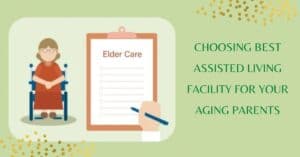Whether you or a family member reside in an assisted living home, you know the annual increased fees. But did you realize what assisted living expenses are tax deductible? If your medical expenses total more than 7.5 percent of your adjusted gross income, including some long-term care costs, you can deduct them from your taxes.
Tax deductions for assisted living expenses are only available if the individual is considered “chronically ill.”
Are senior living expenses deductible?
People often feel excited or stressed during tax season due to medical needs, which can lead to out-of-pocket expenses. Traditional living expenses are not tax-deductible, but some qualify for the medical tax exemption.
Individuals’ tax deductions may vary depending on their personal and financial situation, so speaking with a financial advisor is important to determine their condition.
Tax deductions are available for medical costs that exceed 7.5% of adjusted gross income. Care plans must be presented to be eligible for tax deductions for senior living expenses.
Residents may move to a senior living community for a sense of community or less serious medical needs. Assisted living expenses must meet certain conditions to be tax-deductible. Assisted living costs are usually deductible, but room and board are not.
Room and board expenses may be tax-deductible if the resident is chronically ill and living at the facility for medical care. Medical services provided by home care workers can be deducted.
Can an Assisted Living Facility Resident’s Child Get a Tax Deduction?
Assisted living expenses must be deductible if the resident is deemed “chronically ill” by a doctor or nurse. A care plan must also render personal care services a qualified healthcare provider recommends to be eligible for the deduction.
This calls for creating a plan outlining the precise daily services the resident will receive from a doctor, nurse, or social worker. Most assisted living facilities create care plans for their patients, even though the law does not require this.
Suppose their parents or other immediate family members—including in-laws—qualify as their dependents and reside in an assisted care facility. In that case, adult children may also be eligible for a tax deduction in certain situations.
The family member must be a citizen or lawful resident of the United States or a resident of Canada or Mexico. The adult child must support the family member for over half the calendar year.
What is the Medical Expenses Deduction?
Emergencies in medicine always catch us off, guard. Regarding medical insurance, it is always preferable to be safe than sorry. In India, the vast majority of people lack health insurance.
Therefore, they must rely on their savings or take out loans in an emergency. Your investment portfolio must include medical insurance, and the government incentivizes everyone to do so by providing Section 80D tax incentives.
You must know how much of your monthly contributions go towards medical expenses. So that you can see how much you’ve spent on medical treatment, ask the community to provide a breakdown of services.
You must maintain an itemized record of pertinent medical spending, whether you engage with an accountant or utilize software like TurboTax. The IRS has a list of allowable expenses with detailed instructions on which costs for assisted living can be written off.
Requirements for Assisted Living Tax Deductibility
The resident must be eligible to deduct their assisted living costs under the following circumstances:
It is necessary to define the resident as “chronically unwell.” There are two ways to fulfill this requirement:
- They need assistance with at least two daily living activities (ADLs). Eating, dressing, bathing, transferring, using the restroom, and maintaining continence are the six activities of daily living.
- They require extensive monitoring due to a cognitive impairment such as Alzheimer’s or dementia.
A qualified medical professional administers treatment to the resident following a predetermined care plan. Care plans specify the daily services a person will get. They typically include help with daily living activities.
There’s a significant likelihood that these conditions have been satisfied if you or a loved one is in an assisted living facility. Before writing off any or all of your expenses for assisted living, it’s crucial to speak with a tax professional. Only non-medical costs like spa trips and visitor dinners are subtracted.
Differences Between Assisted Living and Nursing Homes
Residents at assisted living facilities may require some assistance with housekeeping, dressing, personal care, managing medications, and other daily duties, but they still maintain independence.
Nursing home residents need care and monitoring all the time. Kids frequently have more severe medical conditions that necessitate the help of a trained nurse or a physical or speech therapist. Some people need services for respiratory care.
In assisted living, residents can access life-enrichment programs in an individual or group setting and three daily wholesome meals.
Participants in the nursing home receive limited recreational activities and services, including food, laundry, and housekeeping.
Assisted living homes are designed to feel home-like, and residents often live in their apartments or suites with private baths and kitchenettes.
In nursing facilities, private or semi-private rooms without a living area or kitchen are common, creating a more clinical atmosphere.
Assisted living replaces nursing homes, which sometimes prioritize medical care at the expense of residents’ agency, independence, and emotional health.
Assisted living facilities place a high emphasis on both physical and mental well-being because they recognize their interdependence.
Assisted living can immediately enhance your quality of life, making you feel safer, happier, and more optimistic about the future.
FAQs
Yes, assisted living, a nursing home, cause it takes care of elderly people.
Yes, assisted living is cheaper than a nursing home because the nursing home has longer-term medical assistants with serious mental health issues.
Some of the quality is,
- Elderly People
- Health conditions
- No Guardian





